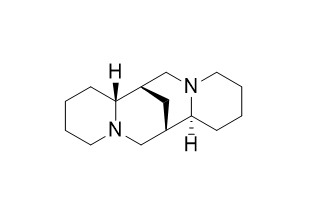Sparteine
Sparteine is a strong inhibitor of mephenytoin p-hydroxylation.
Inquire / Order:
manager@chemfaces.com
Technical Inquiries:
service@chemfaces.com
Tel:
+86-27-84237783
Fax:
+86-27-84254680
Address:
1 Building, No. 83, CheCheng Rd., Wuhan Economic and Technological Development Zone, Wuhan, Hubei 430056, PRC
Providing storage is as stated on the product vial and the vial is kept tightly sealed, the product can be stored for up to
24 months(2-8C).
Wherever possible, you should prepare and use solutions on the same day. However, if you need to make up stock solutions in advance, we recommend that you store the solution as aliquots in tightly sealed vials at -20C. Generally, these will be useable for up to two weeks. Before use, and prior to opening the vial we recommend that you allow your product to equilibrate to room temperature for at least 1 hour.
Need more advice on solubility, usage and handling? Please email to: service@chemfaces.com
The packaging of the product may have turned upside down during transportation, resulting in the natural compounds adhering to the neck or cap of the vial. take the vial out of its packaging and gently shake to let the compounds fall to the bottom of the vial. for liquid products, centrifuge at 200-500 RPM to gather the liquid at the bottom of the vial. try to avoid loss or contamination during handling.
Pharmaceutics.2023, 15(6):1771.
Eur J Pharmacol.2018, 832:96-103
Exp Parasitol.2017, 183:160-166
Int Immunopharmacol.2022, 106:108603.
J Food Sci.2021, 86(9):3810-3823.
J Appl Biol Chem2022, 65:343−348.
Food Hydrocolloids2024, 57:110432
Universite de Bordeaux2017, 2017BORD0867
J Anal Methods Chem.2022, 2022:2229500.
Int J Mol Sci.2018, 19(9):E2601
Related and Featured Products
Pharmacogenetics, 1993, 3(5):256-263.
Evidence for a new variant CYP2D6 allele CYP2D6J in a Japanese population associated with lower in vivo rates of sparteine metabolism.[Reference:
WebLink]
METHODS AND RESULTS:
Human liver preparations were used to screen various drugs for their capability of binding to mephenytoin p-hydroxylase and Sparteine monooxygenase, two cytochrome P-450-catalyzed activities that are independently heritable. For this screening, any indication of competitive inhibition by the drug was interpreted as an indication of binding. Among 64 drugs and alkaloids tested, 24 compounds caused inhibition of mephenytoin p-hydroxylation but the inhibition was weak in most cases; by contrast, 40 of the 64 compounds inhibited Sparteine oxidation, the inhibition being potent in many cases. The only fairly strong inhibitors of mephenytoin p-hydroxylation were the alkaloid papaverine and the monoamine oxidase inhibitors tranylcypromine and nialamide.
CONCLUSIONS:
The results of these inhibition studies confirm the independence of the two monogenic defects observed in different populations. Metabolism is possibly altered in poor metabolizers of mephenytoin with fewer drugs than in poor metabolizers of Sparteine.
Pure & Applied Chemistry, 1994, 66(7):1479--1486.
Enantioselective synthesis via sparteine-induced asymmetric deprotonation.[Reference:
WebLink]
METHODS AND RESULTS:
The deprotonation of achiral alkyl carbamates with sec-butyllithium/(-)-Sparteine proceeds with a high degree of chiral recognition to form substituted alcohols usually with ≥ 95 % ee after reaction with electrophiles followed by de-protection. The stereoselection is kinetically controlled and a qualitative transition state model is proposed. Some studies, concerning the discrimination between both enantiomers of stereogenic alkyl carbamates and on its utilization for the kinetic resolution are reported. The competition between external and internal competition was investigated in few cases.
CONCLUSIONS:
Finally, we disclose a short report on the enantio¬selective electrophilic substitution of 1-methylindene; here the origin of stereo-selection is an thermodynamically driven epimerization of diastereomeric indenyllithium Sparteine complexes.



